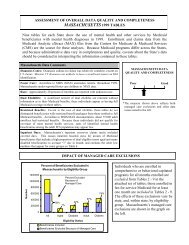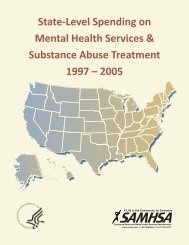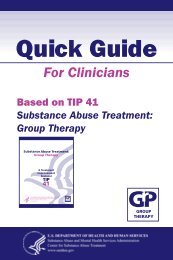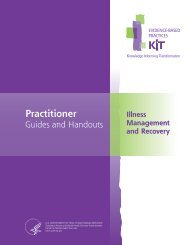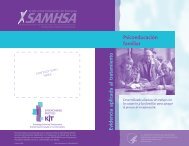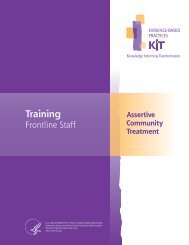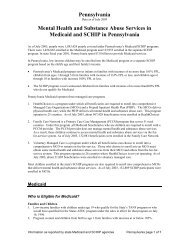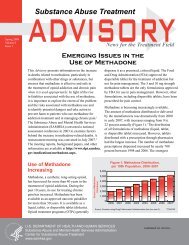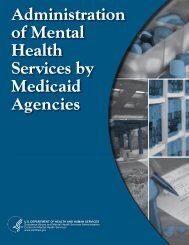Practice Guidelines: Core Elements for Responding to Mental Health
Practice Guidelines: Core Elements for Responding to Mental Health
Practice Guidelines: Core Elements for Responding to Mental Health
Create successful ePaper yourself
Turn your PDF publications into a flip-book with our unique Google optimized e-Paper software.
Iv. maKIng It happen <br />
The need <strong>for</strong> major improvements in crisis services <strong>for</strong> adults, children and older<br />
adults with serious mental or emotional problems is obvious.The statistics presented in<br />
the introduction <strong>to</strong> these guidelines make a clear case that people with mental illnesses<br />
are vulnerable <strong>to</strong> repeated clinical and life crises that can have deleterious effects on the<br />
individual, families and social networks, and communities. Many interventions could have<br />
a significant, positive impact on the frequency and severity of mental health crises, but they<br />
are not readily available <strong>to</strong> most of the individuals who need them. 17<br />
Properly applied, these guidelines should work <strong>to</strong> improve the quality of services <strong>for</strong><br />
people who are in or are vulnerable <strong>to</strong> mental health crises. Embedded in the guidelines<br />
is the notion that crisis services should not exist in isolation; crises are a part of an<br />
individual’s life experiences and the assistance provided during crisis periods is part of a<br />
larger set of services and supports provided <strong>to</strong> the individual.While the values, principles<br />
and infrastructure recommendations presented here focus on crises affecting people with<br />
serious mental illnesses, they also have wider application; they reflect generally accepted<br />
approaches <strong>to</strong> working with individuals who have mental or emotional problems, whether<br />
or not they are in crisis. Stated differently, these guidelines challenge any disjuncture<br />
between responses <strong>to</strong> mental health crises and routine mental healthcare.They demonstrate<br />
how appropriate emergency mental health responses should affrm the principles of<br />
recovery and resilience that are the benchmarks <strong>for</strong> appropriate mental healthcare even<br />
though crisis scenarios may test the application of these values.<br />
From a practice standpoint, these guidelines may be most effectively enacted when<br />
they are embedded in the various quality-control and per<strong>for</strong>mance-improvement<br />
mechanisms that operate within an organization.When appropriately conducted, quality<br />
control and per<strong>for</strong>mance-improvement processes should be data-driven and attuned <strong>to</strong><br />
demonstrating not only what segments of the service population are prone <strong>to</strong> mental<br />
health crises, but also what fac<strong>to</strong>rs underlie their vulnerability.An adequate understanding<br />
of these fac<strong>to</strong>rs requires much more than the “encounter” data now routinely collected by<br />
both healthcare organizations and police. Data collection should clearly reflect the premise<br />
that mental health crises represent problems in care (whether individual or systemic) and<br />
should facilitate the root-cause analyses that are required when significant problems in care<br />
occur. Similarly, data should be used as <strong>to</strong>ols <strong>for</strong> identifying gaps, developing remedies and<br />
moni<strong>to</strong>ring the impact of these remedies. Providers and provider organizations should have<br />
access <strong>to</strong> these data <strong>for</strong> purposes of ensuring the quality of care and the appropriate use of<br />
resources.To the extent that the causes of mental health crises extend beyond the domains<br />
of an emergency department, a hospital, a mental health system, a police department, and/<br />
or a housing authority, data without personal identifiers should be routinely shared across<br />
systems. Entities having oversight responsibility should ensure that these per<strong>for</strong>manceimprovement<br />
activities are being carried out and that opportunities exist <strong>for</strong> cross-agency/<br />
cross-system analysis of in<strong>for</strong>mation and the implementation of strategies <strong>to</strong> reduce mental<br />
health crises.And the partnerships between providers and consumers that are appropriate in<br />
the context of individual crises should be mirrored at the per<strong>for</strong>mance-improvement level.<br />
15



